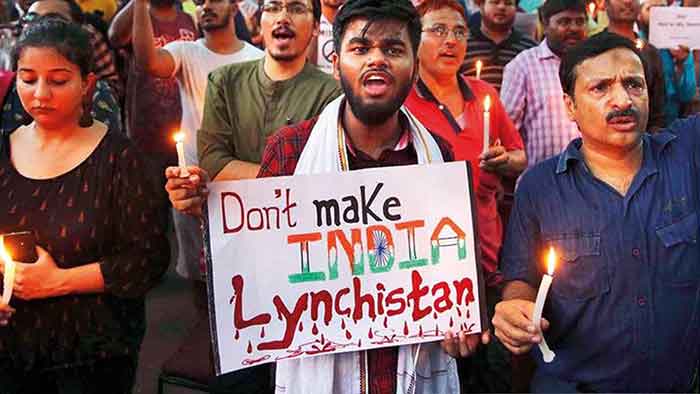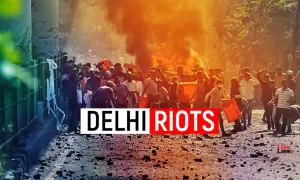Abhay Kumar
“I can’t breathe…”. These were the last words of forty-six-year-old black African American George Floyd. He uttered them when he was being strangled to death by the white American police. His “crime” was his accidental birth in a community that is not a white race.
Similarly, Dalits, Adivasis, lower castes and minority Muslims get strangled in India. Their “crime” is their accidental birth outside twice-born castes. American society does not only strangle George Floyd. Indian society have been, for centuries, strangling George Floyds. The non-Brahmins in India are socially, culturally and economically discriminated.
That is why when Floyd uttered “I can’t breathe”, these words did not sound strange to us. Millions of lower castes and Muslim minority are similarly gasping in pain. They too are uttering the same words in different languages. The mainstream (pliant) Indian media ignores them. It misleads the public by painting India as a “great” civilization. It creates a false binary between the “spiritual” East versus “materialist” West. It tries to build a castle on the decadent social base.
Similarly, most of Indian sociologists, embedded in the establishment, have never accepted the bitter truth. They might again come to refute any comparison between caste and race. They would strongly oppose any argument about Muslims facing institutional discrimination in India.
But people’s movements have never taken them seriously as these sociologists remain preoccupied with presenting India as a harmonious society. As a result, they have already written “obituary” to caste, while caste wars are still happening. They have also opposed reservation for the backward castes, despite the fact that a small population of upper castes monopolize most of jobs. They have put all their energy to prove that Adivasis are part of the Hindu social order. They are never tired of talking of field work and capturing social reality, yet they are hesitant to break the framework of Brahminical ideology.
Just as the black Americans are socially and economically discriminated, so are the lower castes, Adivasis and Muslims in Indian society. Just as the white Americans continue to dominate every institution in the USA, so do the upper castes control the religious and political institutions in India.
Just as a large number of the black Americans live in slums and face poverty, so do Dalits, Adivasis, lower castes, and Muslims. Visit any slum in India, and check the facts if you have any doubt.
Just as the white Americans dominate economy, industry, politics, media, culture and cinema, so do upper castes. For example, how many times have you heard the name of Dalit journalist placed at the helm of affair in the newsroom? How many times have you spotted Muslims in the police, the army and intelligence agency? How many Other Backward Classes (OBCs) professors and lecturers are found at universities?
Racism is durable because the black Americans have little access to resources. Their material deprivation feeds cultural stereotyping. The cultural stereotyping, in turn, puts hurdles in the path of their economic advancement. In sum, one feeds other. It is a vicious cycle. Similarly, caste system and material deprivation of the lower castes are interconnected.
Many people are demanding severe punishment for the killers of George Floyd. The murder deserves severe punishment indeed. But the fight for justice is incomplete without addressing the structural problem. The fight is also not complete if justice is not given to all those George Floyds living in different parts of the world.
That is why, all the victims of mob lynching in India are in fact George Floyds. Landless Dalit laborers killed by feudal caste army are George Floyds. Adivasis who fall victims to the bullets of state repression in central India are comrades of George Floyd. All political prisoners and victims of police encounters and custodial killings are friends of George Floyd.
Just as the community of George Floyd is discriminated by the police and army, so is the Muslim community and other deprived sections in India. It was not just an accident that Muslims were deliberately kept out of the military and police in a “secular” India, soon after the Independence. Similarly, it is not an accident that the home minister of Madras province told the legislative house, after the Independence, that Muslims were not being recruited in the police. In fact, it was not a result of a whim of a particular person but it was a well-designed plan. It was within this plan that a secret circular was drafted and sent to the concerned departments post-1947, stating that Muslims should not be included in the police.
Today Muslims in India comprise just 6 to 7 per cent of the police force in India. But they are over-represented in jail. They are also the main targets of riots and police brutalities. Commission after commission has put the facts on record that the police are communal in their acts. But the police department has not been reformed, the reports of these commissions, instead, are gathering dust.
Similarly, if you are a black American, you are three times more likely to be killed by the police. If you are a Muslim in India, you are several times more likely to be arrested, framed in terror cases and killed in police encounters.
Just as erring police officers can easily go unpunished for attacking the lives and properties of the black Americans, similarly in India one can engineer a riot, demolish a place of worship of a minority community and go unpunished. Sometimes, they are rewarded and voted to power.
That is why I think the cry of “I can’t breathe” is a new slogan for all the oppressed peoples of the world.
In this context, I argue that George Floyd is not only strangled in the USA but he gets strangled elsewhere as well.
George Floyd is strangled in India too.
(Abhay Kumar is a PhD from Jawaharlal Nehru University, New Delhi.)
◆◆◆
First Person: My Caste Privilege in India Blinded Me to the Reality of Racism in the US
Mauktik Kulkarni
An atheist born in a Hindu family, I often dream about reincarnation. No, I don’t want a do-over. In times like these, I want Martin Luther King, Jr to come back and talk to me about racial justice.
I have occasionally seen references to him in essays about Donald Trump being The First White President or Kanye West befriending Trump. However, like most Hindus ignoring caste injustice for generations, I quickly compartmentalised racism as if it did not affect me.
That changed last week when videos documenting racism emerged from Minneapolis and New York. As I was finishing up Ta-Nehisi Coates’s book Between the World and Me, it made me wonder: is that Martin Luther King, Jr talking to me?
He would find a lot to admonish me about. Hailing from a Brahmin family in small-town India, I grew up amid casual casteism. My grandfather was the first general physician in town and the first two rooms of our home were his clinic. Coming home from school, I would walk through his clinic, full of patients from all strata of society. And yet, he wanted to know the last names of the kids I was hanging out with at school. He wanted to make sure I wasn’t hanging out with the “wrong” crowd.
Separate utensils
Grandma was a foot soldier in India’s freedom struggle till 1947 and spent the rest of her life fighting for women’s empowerment. The ideals, though, ended at our doorstep. At home, the cook had to be Brahmin and non-Brahmin maids were not allowed near the kitchen. Domestic workers would get tea and water every day, but in separate utensils. I never saw my parents question these practices. So why would I?
It got worse during college admissions. To make amends for centuries of discrimination against certain castes, India has instituted massive affirmative action programs in colleges, government offices and public sector entities. For years, I was shielded from this history of oppression. All I could see was that half of the seats in colleges were reserved for people from underprivileged castes.
All we learned in engineering college for four years was physics and maths. Nothing about how oppressed castes were denied access to knowledge and scientific inquiry, condemned to menial jobs, stereotyped and seen primarily as servers in our bubbles.
It’s not as if these atrocities are not documented. But they were not training us to be humans. Physics and math made us robots, blithely propagating the inequalities handed down to us. In India, these realities are in your face, but I had happily buried my head in the sand.
The big move
Moving to the United States pulled me out of my ignorance. I was studying the brain and coming back home to learn dignity of labour. Those three beautiful words marked the beginning of my journey of redemption. Through casual conversations, I found out that Brahmins are just 5% of all the Hindus – not 25% as I had assumed, with neither the evidence nor the curiosity to find out.
Most troubling was the question: Am I just another shade of a white supremacist? Five or 25, the percentage didn’t change the answer.
But while America had burst one bubble, it ushered me into another. The more immediate racism around me was out of sight and I kept it out of my mind. My education was offering me opportunities I could not even dream of in India. Across the country, white policemen would occasionally shoot at black men in questionable circumstances, the judicial system would exonerate them, and riots would ensue. I was always miles away, almost on another planet.
In a city like Baltimore, I found a comfortable white suburban cocoon, zipping in and out of a college campus fortified by security guards at every corner. Acutely aware of my surroundings, but never curious about them. And in spite of spending four formative years in Louisville, everything beyond 4th Street – which was more than half of the town – remained foreign to me.
Like millions of privileged-caste Indians in the US, I watched movies about racism and critiqued them over cocktails, but rarely made any black friends. Some used to wake up the next day and equate Hindus’ subjugation under 15th century Muslim rulers in India with that of African Americans. Behind closed doors, they would even draw parallels between the prevailing Hindu nationalist sentiment in India and the undying spirit of Rosa Parks. Oh, the gall!
When I saw that Central Park video, I knew that sense of entitlement like the back of my hand. And when that innocent bystander in Minneapolis raised her phone to capture the tragic, centuries-old story of the black body, she held up a mirror to my soul.
Ignorance is often bliss, but sometimes it is nothing short of a crime. How long am I going to seek comfort in this nightmare?
(Mauktik Kulkarni is an engineer, neuroscientist, entrepreneur, author and a filmmaker. He is the author of A Ghost of Che and Packing Up Without Looking Back.)




